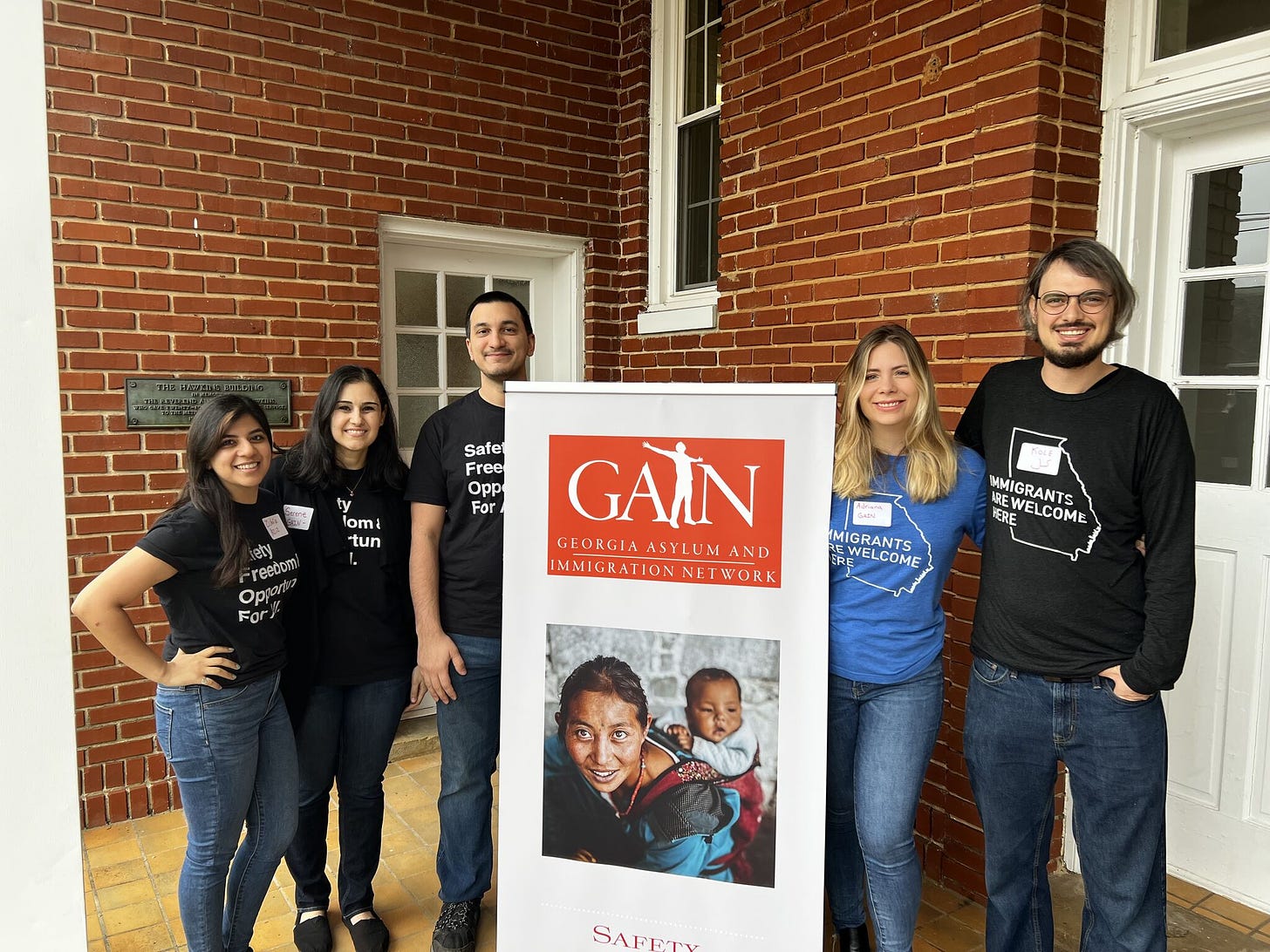“There’s always a high demand.”
Asylum attorneys speak out about obstacles facing people seeking asylum in GA, and why Atlanta needs more pro-bono and low-bono immigration lawyers.

The end of Title 42 on May 11th, a Trump-era public health rule invoked to stop people from crossing the border to seek asylum, has meant that paths to asylum are technically open again. But the battle to actually receive it is an uphill one, not only because of stringent new rules put in place by the Biden Administration, but also because here in Georgia, denial rates have been among the highest in the country for years. 285 South spoke to Atlanta-based immigration lawyers and advocates about why that’s the case, and what legal resources exist (or don’t) for those seeking asylum.
On any given day, Serene Hawasli Kashlan is responding to the legal needs of any of her 88 clients. They represent over 36 different countries, she says, but they all share a common goal to make the U.S. their permanent home. As the Managing Asylum Attorney at the Georgia Asylum and Immigration Network (GAIN), she’s among a relatively small group of people in the Metro Atlanta area providing a service that’s in high demand: pro bono representation for those who are seeking asylum.
Kashlan’s clients are escaping everything from war, to persecution, to gang violence, to domestic abuse. Some of her clients arrived here by walking across the southern border. Some arrived here on visitor visas. Many have been stuck in the asylum legal process for years.
“We have clients from 2015, and they’re like what's going on?,” says Kashlan. “We try to get them expedited if their case is ready…but sometimes they doesn't answer us or they say we can't…It's a waiting game.”
Her clients join more than 70,000 people in Georgia waiting for a final decision from the immigration courts on their applications. For most, their chances aren’t good. Georgia’s immigration courts have among the highest denial rates in the country. Anywhere from 88-97 percent of people passing through the Atlanta Immigration Court were denied asylum by a judge between 2017 to 2022. Although denial rates appear to have dropped in the last two years, they are still well above the national average.
Immigrant advocates are unable to pinpoint a single definitive reason for the denials, but attribute them to a multitude of factors, ranging from political influences and the diverse nature of cases presented in the courts, to the subjective opinions held by individual judges.
“It shouldn't be different based on the state, but politics comes into hand, and depending on who is making these discretionary decisions, because asylum is a discretionary form of relief, it affects how many people are approved,” says Kashlan.
While GAIN is cautious not to cast blame entirely on the judges, there have been issues documented.
A group of Emory University Law students partnered with the Southern Poverty Law Center (SPLC) and observed proceedings at the Atlanta Immigration Court in 2017. Among the findings: Judges “made prejudicial statements and expressed significant disinterest or even hostility towards respondents,” and “routinely canceled hearings at the last minute…creating a culture that denies respondents’ access to court.”
The students also found issues with interpretation, writing in a letter to the U.S. Department of Justice that “court interpreters regularly failed to interpret all English language conversations during hearings for respondents.”
“I would say that stuff has not materially improved,” says Peter Isbister, who represents clients who are currently detained and is Senior Lead Attorney with the SPLC’s Immigrant Justice Project.
One thing that does help increase the chances of asylum—regardless of the judge or the state—is legal representation. Nationally, denial rates for those without representation are between 80 to 90 percent. For those with representation, it’s between 60 and 70 percent.
GAIN didn’t start tracking its success rate until recently, but Kashlan says she knows it makes a significant difference. “So far, we are seeing what we expected—that our grant rate is much higher than the national average of 41% or the average here in the Atlanta court of 11%.”
But finding representation that’s affordable isn’t easy. In Metro Atlanta, there just aren’t enough pro-bono or low-bono immigration lawyers to meet the demand.
“The average cost for an asylum case is $3,000 to $5,000. Someone coming [to the U.S.] with just their suitcase may not have the resources to pay,” says Kashlan. “There are a handful of people who do low bono in the Atlanta legal community. But it’s not enough…there’s always a high demand.”
The number of lawyers providing those services has been growing steadily over the last 10 years, but still, says Isbister, “it’s no more than 50.”
Organizations like GAIN, Asian Americans Advancing Justice - Atlanta, the Latin American Association, the SPLC, the Georgia State Immigration Law Clinic, and Kids in Need of Defense (KIND), and the Tahirih Justice Center all provide legal support to asylum seekers.
Some of these organizations, along with others including the Latin American Association and the International Rescue Committee - Atlanta, are working in coordination to respond to any potential needs that arise from the ending of Title 42, says Adriana Heffley, Director of Legal Services at GAIN. She’s not sure yet whether the new rules will lead to an increase in migration or a slow down in people crossing the border. “We are assessing resources and ways that we can all work together to help serve those who are able to come to the state,” says Heffley.
In the meantime, says Kashlan, whose parents are immigrants from Syria, the high demand is something that’s not likely to change. “It’s unfortunate. There's so much going on in the world and so many people suffering and so many corrupt governments. People are fleeing because they have to.”
Underpinning the whole issue, says Mich Gonzalez, Director of Advocacy Southeast Immigrant Freedom Initiative at the Southern Poverty Law Center, is the fact that there are limited paths to status for most people, outside of asylum. “There are so few paths to status. The reality is…there are genuinely meritorious asylum seekers. And then there are also people who migrate for very valid reasons that don't fall into categories of asylum, but they're completely valid.”
RESOURCES
Georgia Asylum and Immigration Network: 678.335.6040
Southern Poverty Law Center: (334) 956-8200
Asian Americans Advancing Justice - Atlanta: (404) 585-8446
Kids in Need of Defense (KIND): 404) 334-9170
Tahirih Justice Center: 470-481-4700





Thank you for reporting on this group. I did some donation distribution help with New American Pathways years ago. I appreciate the invitation through reading to remember that only through luck and circumstance have I not suffered an oppressive or dangerous environment and needed to uproot my life only to be met with years of bureaucratic carelessness.